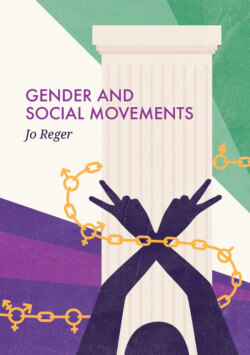Читать книгу Gender and Social Movements - Jo Reger - Страница 10
How More Than Gender Matters
ОглавлениеAny discussion of gender and social movements needs also to include a discussion of intersectionality. Often credited to Kimberlé Crenshaw (1991), and emerging from the work of Black feminist activists and scholars, intersectionality is the idea that we are a complex combination of social identities that need to be considered in relation to each other (Combahee River Collective 1978; Deborah King 1988; Patricia Hill Collins 1990). Black feminist theorists conceptualized race, class, and gender as interlocking systems of oppression, forming a “matrix of domination” in which one social identity cannot be understood completely without considering all aspects of a person (Collins 1990). This matrix of identities influences our interactions, opportunities, and access to resources (Collins 1990; hooks 1989). Intersectionality was conceived through the work of U.S. Black feminist theorists to address the racism, classism, and homophobia of the women’s movement with the goal of dismantling the concept that all women experience society in the same way – or “universal womanhood.” In particular, Black feminists argued that they could not be understood as either Black or women but as both. They argued for understanding people as both/and as opposed to either/or. The concept of intersectionality is key in much of the research on gender, allowing scholars to conceptualize people as more than just a gender category. Instead, scholars explore the ways in which other social identities such as race and class influence how people experience gender.
The use of intersectionality in gender theory is important to the study of social movements. A singular focus on gender in movements does not adequately capture the dynamics of gender, race, and class (among other social identities) for people engaged in social movements and how this intersection of identities shapes their experiences. An intersectional perspective also allows for an examination of how political resources and access to power varies by social groups. By not treating all social movement participants as equal in their ability to mobilize resources and influence political elites, intersectionality as a lens can examine the impact of gender along with race, ethnicity, class, sexuality, and religion (among other categories) when considering social inequality. In the chapters that follow, I present research that often examines only gender and social movements, and then work to complicate these views with an intersectional perspective.
